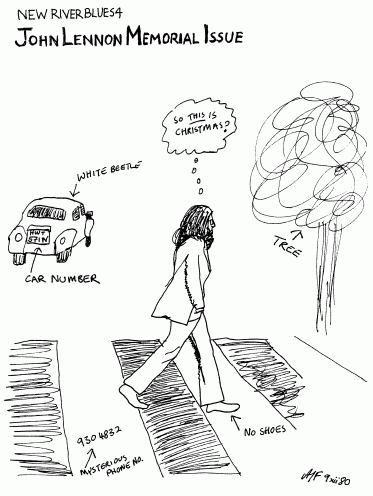

He was my Favourite Beatle. Men (presumably) and the young punk set will not understand the significance of that, but anyone female who was at secondary school between say 1963 and 1967 will.
"Which one do you like best, then?"
If you answered Paul, you were one of the suburban conformist majority; if you said Ringo you were a copout who probably preferred Clive Dunn singing Grandad; if you said George you were either a religious maniac or being deliberately perverse. The realfans liked John. He stood for a mixture of toughminded realism (the leatherjacketed hard rocker side of him), wit, and intellect. Paul on the other hand was a pretty boy from a soggy fantasy world, the cuddly side of the Beatles that the press so loved. They played out these roles long after the images were formed: consider if you like the semiology of apartment in New York versus dope-farm in Scotland.
John was always the 'clever one' -- with its implications of being a misfit. He was, and don'cha fergit it, the first of the artschool rockers. Overbright working class boys have a pretty rotten time, but so do overbright girls of whatever class. As a schoolgirl, I always had this sneaking fear that the best life could offer me once I got outside them walls was some kind of anarchist nunnery. Dreaming sweetly in Latin lessons of a man as complex and wonderful as my own fond selfimage, I was rather painfully aware that no way did the boys I knew match up to the specification. Yer basic rock'n'roller, who was physically interesting (lean strong hard and all that) kept a pretty Neanderthal brain inside that sexy body; while yer bright sensitive artistic types were -- well, sort of weedy and dull -net to mention more scared of me than I was of them. But John provided a bit of hope, in that he was living breathing concrete empirical evidence that a man could combine rocking and reason. He, because he was like he was, made it possible for me to go on enjoying rock music on a basic gut level after I'd identified myself as a thinker, at 14 or so. And he invented a wonderful phrase -- mind guerilla -- which in my more manic moments is what I like to think I am.
John was a privileged individual. As a Beatle and a multimillionaire he could afford to be the magical mess of apparent contradictions that made him the dream lover of the lonely suburban bluestocking. I suppose the failure of Apple as originally conceived shows that in the real world even the Beatles couldn't actually do whatever they liked with their money, but as far as one can tell from the record that disaster was a result of rows in the group opening up entries for outsiders to come in and grab what they liked. John's position as the worlds richest revolutionary had positive results, however.
Occasionally in the history of the world there is an accident so happy as to almost make me wish to revise the line on the existence of god. Take Bath for instance. Rainwater drops on the Mendip Hills, trickles down for 10,000 years to the earth's core, which heats it up, then it whizzes up through a weakness to come out -- just the right temperature. That to my mind is almost as miraculous as the fact that the one Beatle to evolve any sort of political perspective evolved the one he did. Can you imagine if all that power to influence the ideas of ordinary people had gone to a Nazi? Or a follower of the Militant Group? Or anyone at all really but a good old libertarian leftie sexual revolutionary feminist pacifist anticapitalist pigheaded individualist? Give or take Ireland, John's recorded utterances add up to as near as you'll get to the Right Stuff. And he always addressed them to the individual listener, relating things to what people did themselves, not to 'how society ought to be':
I'm gonna ask you comrade and brother
How do you treat your own woman back home?
She gotta be herself
so she can give herself
Singing, Power to the People!It's all in there, you know.
The other thing John did for us all was marry Yoko, and forge the first link between (gulp) avant-garde art movements and pop culture. This has been pretty fruitful; look at the backgrounds and statements of what I still call punk rockers. Before John, rock music, though of course regarded by people's mums as terrible modern revolutionary rude stuff, was actually as good an example of sheer mutton headed philistine cultural conservatism as you'd find in Camberley or Surbiton or anywhere. John went and married this funny Japanese lady who made films about bottoms. We ain't won the war yet that we should have won in about 1912, but John won a pretty important battle, the battle for the sympathy of the bright kids.
But all these rational reasons for admiring the man can't tell me why I and others loved him. To get near that you have to look at some images. Photographs of him wearing white suit, plimsolls, long hair and a vulnerable expression; photographs of him in jeans and short hair; above all the image on the cover of Abbey Road. The exact angle of his shoulders somehow suggests solitude combined with absolute selfconfidence; someone who knew he was alright. Someone who believed in the possibility of freedom, and didn't mind coming out and saying so. Someone who had to fight to be what he wanted to be, and having won the battle knew he could win anything. Above all, someone who felt safe from the outside world's mockery. But he wasn't safe from the violence that that world offers instead of solutions -- the force of Unreason.
New River Blues 4 (1980)